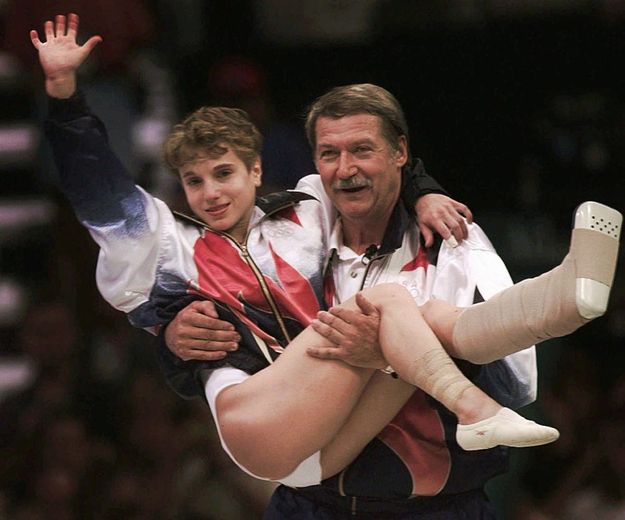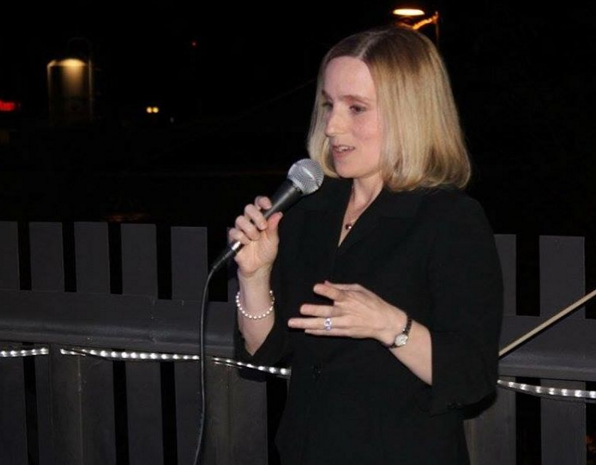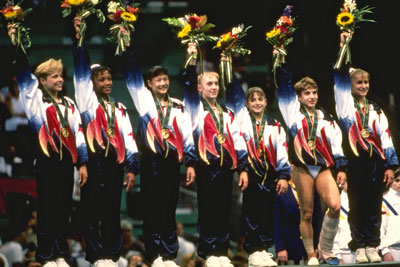1996 Gymnastics Gold Medalist Kerri Strug on the Importance of Hard Work
1996 Gymnastics Gold Medalist Kerri Strug on Her Olympics Experience and the Importance of Hard Work

“So, Kerri Strug, it’s up to her,” I heard the Olympics announcer say as I sat glued to the television, anxiously watching the U.S. women’s gymnastics team compete in Atlanta’s 1996 Summer Olympics. As a 7-year-old gymnast myself at the time, I was captivated, rooting for the “Magnificent Seven” to take home the first team Olympic gold for gymnastics in United States history.
The last event of the team round was the gymnastics vault. Each girl had taken a turn, and it was up to 18-year-old Kerri Strug to bring home the gold medal. I could only imagine the adrenaline and rush of excitement pounding through the hearts of this gymnastics team – as well as people all over the entire world on the edge of their seat watching.
And then it happened. On her very first vault Kerri Strug landed in a way that severely twisted her ankle. As pain shot across Kerri’s face as well as through the hearts and minds of the entire nation, it became an unforgettable moment in U.S. Olympics history. Kerri hopped on one foot trying to decide what to do next, and her U.S. Olympic coach, Bela Karolyi yelled, “You can do it!”
With a jolt of perseverance and determination, and with the U.S. Olympic gold medal on the line, Kerri Strug took her place back at the beginning of the vault runway to complete one final vault. And she did it. Kerri landed her second vault – scoring a 9.712 and taking home the gold for her U.S. Olympics gymnastics team.
This year, 2016, marks the 20 year anniversary since one of the greatest moments in both women’s gymnastics and Summer Olympics history. Kerri Strug herself has gone on to share her story and words of power and encouragement to individuals all over our country on the topic of hard work, dedication, and doing whatever it takes to pursue your dreams.
At a recent interview prior to our Cox Media client event in Tucson, AZ, Kerri’s hometown, we had the opportunity to sit down to ask her a few questions related to her Olympics experience, how to chase your dreams, and advice for both business owners and athletes alike today:

1. What was your favorite part about being in the 1992 and 1996 Summer Olympic Games?
Kerri Strug (KS): I think for me, I had always just dreamed of becoming an Olympian from the time I was 6 years old, so just having that fulfilled was amazing. I think in my mind I thought, “Oh, I am going to see all the other athletes and watch the other events…” which is not really what transpires when you are competing, because you need to focus on yourself and your competition. Nonetheless, I got to meet the dream team and certain people I had only seen on television that I had looked up to. So that was very exciting. But I think representing the United States at the Olympic games was something I had always wanted, so that was the best part about it, the self-satisfaction of accomplishing that mission.
2. Through all the training, practice and hard work-outs leading up to the Olympic Trials and ultimately the Summer Olympic games, what would you say it was that kept you motivated to keep going?
KS: I think just wanting to fulfill your dream. You definitely have down time if you have an injury or you are having a hard time with a skill, but that internal desire to follow your quest for gold is always kind of there. And you may say “oh, I want to give up,” but then you think “oh, but maybe it will be worth it.” As a youngster, you learn how to try to play mind games with yourself and take it one step at a time like you are climbing a ladder. Because, otherwise it is just too overwhelming to look at it like, “I have to train from one Olympics to the other over the next four years.” You need to break it down and be realistic in terms of having both short-term and long-term goals. Most athletes that rise to that level too do have a passion for the sport that they’re in – and it’s a love/hate relationship (laughs).

3. What was your favorite event?
KS: I think my favorite was always the floor exercise. I think when you know you are good at something and don’t get as nervous in a competition it becomes your favorite because you always do extremely well.
4. What was the most surprising thing you experienced about being in the Summer Olympics (both 1992 and 1996)?
KS: The biggest surprise for the first go-around when I went to Barcelona Summer Olympics in 1992 was that it is just like any other competition, but all the other athletic events are there. I think in my mind it’s the pinnacle of your career per se for many athletes. But at the end of the day you have to trick your mind into thinking it’s just like any other competition. And it really truly is. You have prepared long and hard and it’s the same apparatuses and you are to do the same thing that you do every day in practice. But I think for many athletes it’s like that stigma that “this is the Olympics and you have one shot” and then you have four more years. It’s a mental thing; it’s a positive mental thing. Having the opportunity to be there and shine and represent your country and yourself and your sport. I think especially the sport of gymnastics is not highly attended and valued in between the Summer Olympics and then every Summer Olympics it’s like the favorite. So that puts gymnasts in an interesting situation, especially now that you can capitalize on your success and things like that. It doesn’t matter if you win the World Championships multiple times, it’s if you win that Olympic gold. So I think that’s what makes it so exciting, but it also many it detrimental if you don’t do well.

5. Going back to the moment on the vault at the 1996 Olympics, what went through your head to get back up again and pull through that second vault after you had gotten hurt?
KS: As an athlete on that level, you are kind of prepared for situations where you are going to be in pain or where you are not at your best. My coach Bela all the time was like, “I’m sorry you don’t feel well – but you still have to get up and do it,” and his mentality was, “it will be that much easier when you feel good.” So I’m not saying that’s the way it should be for all athletes, and clearly if you have a broken arm and leg and things like that, but you know when you have aches and pains here or there I think often times it’s good to push through them because it does make you stronger.
6. So there was no question in your mind you were getting back up to do that second vault?
KS: Yeah, I think I was nervous no doubt about it. But I wasn’t just going to walk away either. We didn’t know if we needed a second vault or not for Olympic gold and my teammates had done their job. I was fortunate I had a lot of adrenaline running through my body. I think it was muscle memory; I had done that vault so many times and just kind of went on automatic pilot. And I was lucky, it could have gone the other way too, I realize that! But I also think that hard work eventually does pay off in some way, shape or form, and that was it for me. All those years of training and doing the vault over and over when you think enough is enough and your coach is like, “Nope! More. Do it again. It can be better.” And now I’m so glad he did that.
7. What would you say is the biggest life-lesson you learned from either Bela Karolyi, your team or all of those hours in the gym preparing for the Olympics?
KS: I think athletics parallel life in a lot of ways. So I think dedication, perseverance, I mean literally and figuratively; if you fall down you have to get back up and that’s like life. Not everything is always going to go your way. But it’s how you deal with those set-backs or those barriers is how successful you’ll be. Everybody has things that come into their life that they are faced with. Those that persevere and move forward and make the best of the situation are those that rise to the top. I think your attitude carries you forward.

8. What advice would you give to someone who is chasing their dreams whether it is in athletics or even starting their own business?
KS: I think there are some core values to being successful. I think doing things the way that they should be and not cutting corners. Putting in the time and the hard work is of the utmost importance. Because it doesn’t matter how much talent or how savvy you are, if you don’t do what is needed you probably won’t be as successful as you could be. I think having a good support system, because you are going to have set-backs. You need somebody to help you when you are down and push you through those hard times. For me I think just dedication and perseverance are crucial because you are going to learn from your mistakes and move forward and hopefully do much better the next go-around. I mean when you look at a lot of successful people whether it is in athletics or business you will often times think, it’s kind of like you are at the bottom before you can jump up to the top. Also, to have a passion for whatever you are doing, because if you don’t, I don’t think you are going to have the ability to put in all the effort that is mandated. You need to find what drives you – that’s not to say it is easy on a day-in day-out basis, but that overall you are driven by what you are trying to pursue.
9. What advice would you give to any athlete who is preparing and trialing to go to Rio?
KS: “Enjoy the ride.” For me, it was always “the end” or “the goal” and not always about fully embracing the journey. Olympic athletes – whether it is their first or their last – they are there for the sport they love and it will be over before you know it. Enjoy the moment, enjoy the training although it’s difficult, and enjoy being an athlete. Embrace the competition and enjoy your time there in Rio because, that’s it! And you have to wait until the next games. I think, you know, the Olympics are very exciting for everyone, and we love to see the stories that come out of them. Of course medals are important and everybody loves the winners, there is no doubt about that. But at the same point, I think sometimes we are inspired by some other stories like the Dan Jansen, he falters, falters, falters and then comes back, or the Kenyan swimmer who gave it his all and had no shame. I think those sort of stories inspire everyone to better people in whatever they do. So that’s what I really enjoy watching them because it’s great to see athletes accomplish their dream and learn more about the steps they took in order to get there.

Well there we have it. Kerri’s experience and insight speaks volumes to the importance of hard work, dedication and perseverance in accomplishing our goals. We are excited to watch hundreds of athletes chase their dreams this August for the 2016 Summer Olympics in Rio. Whether you are a local business owner, an avid sports fan, or just looking forward to the 2016 Summer Olympics in Rio, this year’s Summer Olympics provide a spirit that unites all audiences.
Looking for more Olympics information?
- ARE YOU READY FOR RIO? Check out this fun infographic to put your Olympic knowledge to the test.
- A SPIRIT THAT UNITES. Read the top five reasons YOU should be watching the 2016 Summer Olympics.
- KNOW YOUR AUDIENCE. Learn more about WHO is tuning in to the biggest event of the summer.
Interested in advertising with us? Contact Cox Media today to learn how your business can unite with the spirit of the Summer Olympic Games.

Connect with a Marketing Expert
Share Post On Social
Related Insights
Connect With Your Local Marketing Expert
You know your business. We know advertising. Together, we can bring your business to more people. Contact a member of our team today. We’d love to help you grow.

